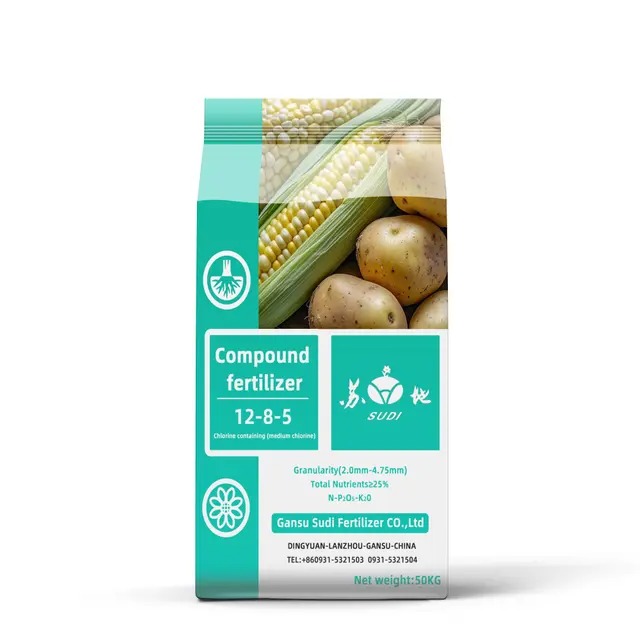Please Choose Your Language


Views: 314 Author: Site Editor Publish Time: 2025-09-10 Origin: Site








Compound fertilizers are essential in modern agriculture, providing a balanced blend of multiple nutrients to crops in a single product. Unlike simple fertilizers that deliver only one nutrient, compound fertilizers combine essential macronutrients such as nitrogen (N), phosphorus (P), and potassium (K), often supplemented with secondary nutrients like sulfur (S) and chloride (Cl). This multi-nutrient approach ensures optimal plant growth, enhances soil fertility, and increases crop yield efficiency. Among compound fertilizers, sulfur-based and chloride-based variants have gained prominence due to their distinct advantages in improving soil structure, nutrient absorption, and plant health.
Sulfur-based compound fertilizers primarily contain sulfur along with N, P, and K. Sulfur plays a vital role in plant metabolism, protein synthesis, and enzyme activity. Chloride-based compound fertilizers, on the other hand, incorporate chloride, which, when used in appropriate quantities, contributes to osmoregulation and photosynthetic efficiency in crops. Choosing the right type of compound fertilizer depends on soil conditions, crop requirements, and environmental factors. For farmers and agronomists, understanding the advantages of sulfur-based and chloride-based fertilizers is critical for maximizing productivity while maintaining sustainable agricultural practices.
Sulfur-based compound fertilizers offer multiple benefits that extend beyond simple nutrient supplementation. Sulfur is an essential secondary macronutrient, directly influencing amino acid and protein synthesis. Plants deficient in sulfur often exhibit stunted growth, pale leaves, and reduced chlorophyll content. By providing sulfur in a compound fertilizer, crops can achieve more robust root systems and enhanced resistance to environmental stressors. Additionally, sulfur helps regulate soil pH, particularly in alkaline soils, improving nutrient availability and microbial activity. This soil conditioning effect is especially beneficial in regions where prolonged cultivation has led to nutrient depletion.
Another critical advantage of sulfur-based fertilizers is their role in enhancing nitrogen utilization. Nitrogen and sulfur work synergistically in protein formation, ensuring that crops efficiently convert absorbed nitrogen into valuable biomass. Studies have shown that crops treated with sulfur-enriched compound fertilizers exhibit higher protein content in grains and improved overall quality. Moreover, sulfur-based fertilizers contribute to environmental sustainability. Properly formulated sulfur compounds reduce nitrogen volatilization and minimize the risk of nutrient runoff, mitigating the impact on surrounding ecosystems. In essence, sulfur-based compound fertilizers deliver not only immediate growth benefits but also long-term soil health improvements, making them a strategic choice for high-yield, quality-focused farming operations.

Chloride-based compound fertilizers provide unique advantages, particularly in water management and crop resilience. Chloride, often considered a micronutrient, plays a pivotal role in regulating osmotic pressure within plant cells. This regulation enables plants to maintain water balance during periods of drought or saline stress, improving survival rates and sustaining growth under adverse conditions. Furthermore, chloride facilitates photosynthesis by supporting stomatal function and enhancing the efficiency of light energy conversion. For crops grown in high-stress environments, chloride-based fertilizers offer a critical boost to physiological stability and productivity.
In addition to water regulation, chloride contributes to disease resistance and nutrient uptake efficiency. By modulating ion transport in plants, chloride improves potassium and nitrate absorption, leading to more uniform growth and higher yields. Chloride-based compound fertilizers are also valued for their fast solubility and adaptability to various soil types. Unlike some slow-release formulations, these fertilizers dissolve readily, making nutrients immediately available for absorption. This rapid availability is particularly advantageous in intensive farming systems where crops have high nutrient demands over short growth periods. Overall, chloride-based compound fertilizers present a reliable solution for enhancing plant vigor, resilience, and yield consistency.
To help growers make informed decisions, the following table summarizes the key differences and advantages of sulfur-based and chloride-based compound fertilizers:
| Feature/Benefit | Sulfur-Based Fertilizers | Chloride-Based Fertilizers |
|---|---|---|
| Primary Nutrient Role | Supports protein synthesis and enzyme activity | Supports osmoregulation and photosynthesis |
| Soil Interaction | Improves pH balance, enhances microbial activity | Enhances nutrient absorption and water balance |
| Crop Growth Effect | Promotes robust roots and leaf health | Increases stress tolerance and disease resistance |
| Nutrient Synergy | Enhances nitrogen utilization | Improves potassium and nitrate uptake |
| Environmental Impact | Reduces nitrogen volatilization | Minimizes nutrient deficiency under drought or saline stress |
| Speed of Nutrient Availability | Moderate release | Fast solubility and rapid uptake |
To maximize the advantages of compound fertilizers, precise application techniques are essential. Sulfur-based fertilizers are generally most effective when applied as basal fertilizer before planting or during early growth stages. This timing ensures that sulfur is readily available when plants begin active protein synthesis and leaf development. Soil testing prior to application can identify sulfur-deficient areas, allowing for targeted fertilization that avoids excessive use and minimizes environmental impact. In contrast, chloride-based fertilizers are often applied during periods of high water stress or when rapid nutrient availability is required. Foliar application or fertigation techniques can enhance chloride absorption efficiency, particularly in crops sensitive to osmotic stress.
Additionally, integrating both sulfur-based and chloride-based fertilizers in a strategic nutrient management plan can yield synergistic benefits. Alternating or combining applications according to crop stage, soil characteristics, and climatic conditions allows farmers to optimize growth, enhance resilience, and maintain sustainable soil health. Precision agriculture tools, such as GPS-guided application and variable rate technology, further ensure accurate distribution and minimal nutrient loss, aligning with both economic and ecological objectives. By adopting best practices, farmers can harness the full potential of compound fertilizers while minimizing the risks of over-application or environmental contamination.

Q1: Are sulfur-based fertilizers suitable for all crops?
A1: While sulfur-based fertilizers are broadly beneficial, they are particularly effective for crops with high protein demands, such as wheat, legumes, and oilseeds. Soil testing is recommended to determine sulfur deficiency before application.
Q2: Can chloride-based fertilizers harm crops?
A2: Excessive chloride can lead to leaf burn or reduced growth. Proper dosage, soil testing, and controlled application methods prevent potential negative effects while delivering the benefits of enhanced osmoregulation and photosynthesis.
Q3: How do I choose between sulfur-based and chloride-based compound fertilizers?
A3: The choice depends on soil nutrient status, crop type, and environmental conditions. Sulfur-based fertilizers are ideal for protein-rich crop support and soil conditioning, while chloride-based fertilizers excel in stress tolerance and water management.
Q4: Can these fertilizers be combined?
A4: Yes, combining or alternating sulfur-based and chloride-based fertilizers can provide balanced nutrition, support growth, and improve yield under varied soil and climatic conditions.
Compound fertilizers, particularly sulfur-based and chloride-based variants, represent a cornerstone of modern agricultural productivity. Sulfur-based fertilizers enhance protein synthesis, improve soil health, and increase crop quality, while chloride-based fertilizers support osmoregulation, photosynthesis, and stress resilience. By understanding the distinct advantages of these fertilizers, growers can optimize nutrient management, improve yield consistency, and maintain sustainable farming practices. Employing precision application techniques and integrating these fertilizers into a well-planned nutrient strategy ensures both immediate and long-term agricultural benefits. Ultimately, the careful selection and application of sulfur-based and chloride-based compound fertilizers empower farmers to meet the dual goals of productivity and sustainability in an increasingly challenging agricultural landscape.

